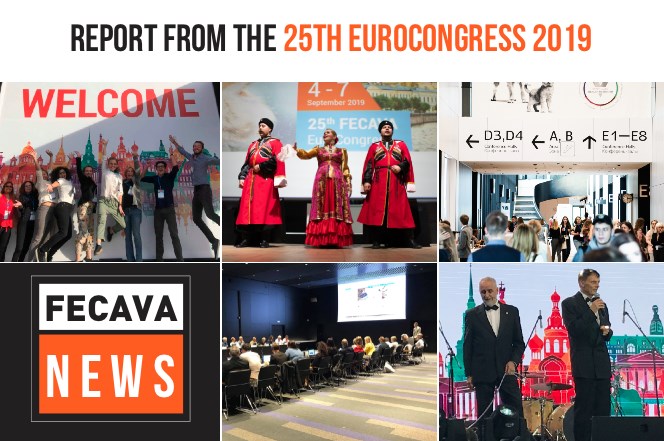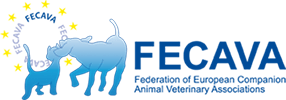
FECAVA EuroCongress 2019
September saw the 25th FECAVA EuroCongress take place for the first time in St. Petersburg, Russia. The local organising committee, led by Alexander Tkachov and RSAVA President, Sergey Sereda, undertook the hard work to bring this event to fruition.
A great scientific program, with lectures covering important topics in small animal medicine and surgery, was compiled under the supervision of David Senior and attracted over 3200 delegates from all over Europe reaching a record attendance. Its highlight on the second day was the FECAVA Symposium on Canine Vector Borne Diseases, organised by the FECAVA Working Group on Vector-Borne Diseases.
Ten student delegates, who won the FECAVA Veterinary Student Scholarship, also attended the Congress. IVC Evidensia will sponsor the scholarship for the next two years.
The official opening of the Congress took place at the end of the first day of lectures with the Opening Ceremony. The FECAVA President, Wolfgang Dohne and RSAVA President Sergey Sereda along with Sylvia Burbery, Regional Asia Pacific President of Royal Canin welcomed the participants. In his speech, Wolfgang Dohne touched on Russian science history, mentioning Pavlov, Ilizarov, and their important achievements, which also contributed to the development of veterinary medicine. Ivan Petrovich Pavlov is depicted on the FECAVA membership card for the year 2019. Dr Dohne complimented the ambition and vision of Sergey Sereda and Alexander Tkachov, which led to FECAVA EuroCongress hosted by Russia, and encouraged participants to take the advantage of an international congress to meet colleagues from different countries and exchange views.
RSAVA President, Sergey Sereda, thanked his co-organizers, sponsors, and FECAVA for their trust with the organisation of the Congress, which took 5 years of work.
Ms. Sylvia Burbery, the Regional President Asia Pacific of Royal Canin, the diamond sponsor of the Congress, emphasized the importance of their partnership with veterinarians and stated that it will continue to be an important part of the veterinary profession in the future. She mentioned the company’s vision to meet the specific needs of every cat and dog, based on age, lifestyle, breed and health conditions and highlighted a few of their most important products: liquid nutritional formulas, Anallergenic and novel tools for haematuria detection. Royal Canin is convinced that official associations like FECAVA contribute to the development of veterinary practice and popularisation of the profession, which is why they are proud to support the congress. Ms. Burbery also announced a long-term commitment of Royal Canin to support veterinary education in Russia.
At the Opening Ceremony, The Didier Noel Carlotti Award 2019 was presented. The award is named after the “father” of the FECAVA organisation, whose work inspired many young veterinary professionals. Following his example, the award is given to someone, who Is not only a good veterinary surgeon, but an inspiring individual who will bring the profession forward and inspire young colleagues. Wolfgang Dohne presented this year’s award to Dr. Bogdan-Alexandru Vitalaru, assistant professor from the Faculty of Veterinary Medicine, USAMV Bucharest, Romania.
On Friday, the evening ended with a Congress dinner at the historical Summer palace, where a special and unusual FECAVA prize, the Athenian Helmet was awarded to Käthi Brunner from Switzerland.
During the congress days, FECAVA directors participated in various working groups, and some of these groups presented reports of their progress on the last day of the congress at the Council Meeting. FECAVA has several working groups, whose purpose is to develop standards, guidelines and to formulate position papers. Directors can participate in any of the groups.
The FECAVA Council Meeting was held on Saturday 7th September. The initial greetings from FECAVA President and RSAVA were followed by reports on board activities, finances and marketing. Thierry Chambon gave an update on FVE (Federation of Veterinarians of Europe) and UEVP (Union of European Veterinary Practitioners) activities. Last year, FVE performed the second Survey of the Veterinary Profession in Europe, which included 30 countries. The results will be released in October 2019 and will be freely available.
In the Policy Working group report, Danny Holmes mentioned the importance of the fight against antimicrobial resistance at the level of the European Union and FECAVA participation within it. Among other things, he introduced the idea of electronic pet passports. It wouldn’t replace the current paper passport but it would help in updating the data and having them available at all times. The microchip would be a gateway to the electronic database.
In the Working group on Canine Vector-Borne Diseases, Stephan Neumann replaced Nenad Milojkovic as Chair. The group will continue their great work by developing information on the topic of feline diseases. They also intend to make four or five fact sheets available by the end of next year and deliver them together with lectures at different congresses.
Wolfgang Dohne presented the WSAVA Regulatory Harmonization Joint position statement, which proposes whenever possible, to harmonize the drug regulatory process to help improve animal welfare. FECAVA agreed to support this document. The statement has already been signed by WSAVA, WVA, Health for Animals and by several other organisations.
Jerzy Gawor highlighted the need for public education on animal oral health and dental problems. He presented a plan to produce Dental Fact sheets, which will contain information for the public following the recommendations of veterinary dental specialists. Their purpose would be to make the public aware of the fact that oral problems are associated with pain and therefore should be recognized as a welfare issue in animals. They would be an aid to educating owners on what is normal and abnormal so as not to neglect the important physical signals from their pets. The timeframe for completing the fact sheets is 12 months – in time for the Warsaw Congress.
Ann Criel presented the position paper on Early Neutering of Kittens, written by the FVE Animal Welfare Group. The paper defines early neutering and states its advantages and dis-advantages. It was adopted at the FVE General Assembly in Bratislava and is now supported by FECAVA.
At the end of the Council Meeting elections for the new FECAVA board took place and Denis Novak succeeded Wolfgang Dohne as the new FECAVA President. Future EuroCongresses dates were announced. Next year, a joint FECAVA and WSAVA Congress will be hosted by the Polish Small Animal Veterinary Association between 23rd and 26th September 2020 in Warsaw. Super early bird registration is already available.
This will be followed by the 27th FECAVA EuroCongress, which will take place between 8th and 11th September 2021 in Prague, Czech Republic.
Check the Gallery from the congress.
Leave a reply

Leave a reply